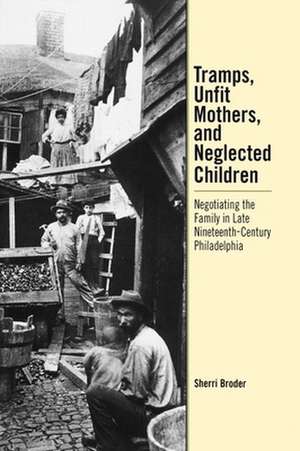Tramps, Unfit Mothers, and Neglected Children – Negotiating the Family in Nineteenth–Century Philadelphia
Autor Sherri Broderen Limba Engleză Hardback – 25 apr 2002
Preț: 341.45 lei
Nou
Puncte Express: 512
Preț estimativ în valută:
65.36€ • 71.02$ • 54.94£
65.36€ • 71.02$ • 54.94£
Carte tipărită la comandă
Livrare economică 21 aprilie-05 mai
Preluare comenzi: 021 569.72.76
Specificații
ISBN-13: 9780812236545
ISBN-10: 0812236548
Pagini: 272
Ilustrații: 1
Dimensiuni: 152 x 229 x 15 mm
Greutate: 0.54 kg
Editura: MT – University of Pennsylvania Press
Locul publicării:United States
ISBN-10: 0812236548
Pagini: 272
Ilustrații: 1
Dimensiuni: 152 x 229 x 15 mm
Greutate: 0.54 kg
Editura: MT – University of Pennsylvania Press
Locul publicării:United States
Cuprins
Introduction
1 "Tramps, Fallen Women, and Neglected Children": Political Culture and the Urban Poor in the Late Nineteenth Century
2 Informing the "Cruelty": Laboring Communities and Reform Intervention
3 Dens of Inequities: Laboring Families and Reform Intervention
4 Illegitimate Mothers, Redemptive Maternity
5 Murderous Mothers and Mercenary Baby Farmers?
Conclusion
Abbreviations
Notes
Index
Acknowledgments
Notă biografică
Sherri Broder is affiliated with the Women's Studies Scholars Program at Brandeis University.













